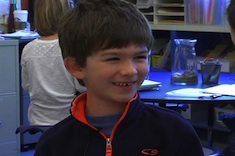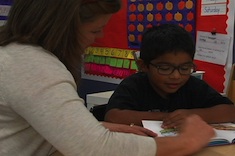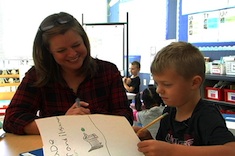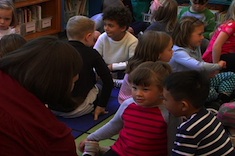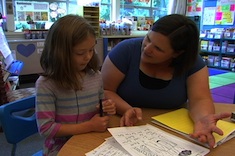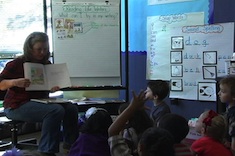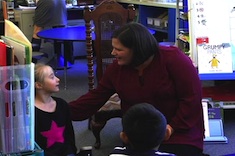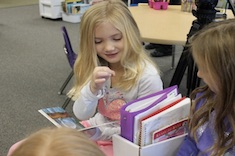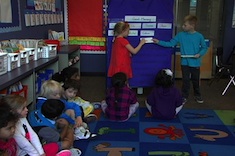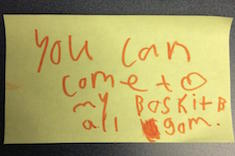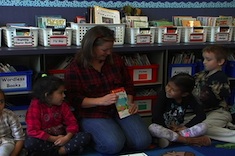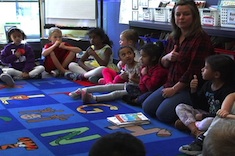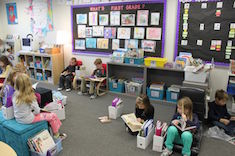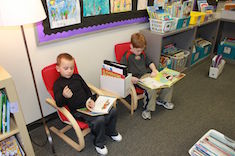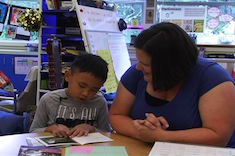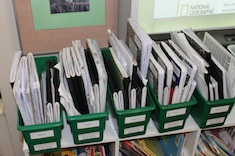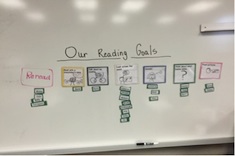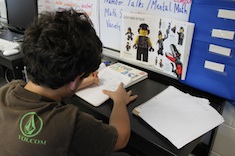1st
Latest Content
Writing Share Structures
Katrina Edwards moves her first-grade class out of a rut with writing shares by introducing many new options.
Lunchtime Storytelling
Katrina Edwards dreads lunchtime with her first graders, until she makes a conscious effort to build storytelling skills and share experiences more thoughtfully within the group.
Connecting Reading and Thinking Minilesson
Bitsy Parks uses read alouds from earlier in September to teach the key building block of comprehension—connections.
Conferring in First Grade: Reading Illustrations
Katrina Edwards helps a first grader use pictures to help her make sense of confusing text.
Connecting to Text: First-Grade Conference
Bitsy Parks confers with first grader Leo early in the school year, reinforcing the basic principle of making connections to text while reading.
Celebrating and Nudging: First-Grade Writing Conference
Bitsy Parks takes time to celebrate first grader Colson’s finished writing, even as she nudges him to try a technique shared in the day’s minilesson.
Joy
Katrina Edwards deals with a frustrated writer on the verge of tears in her first-grade classroom. She realizes the element that is missing in her writing workshop is joy.
Brave Writers
Katrina Edwards has her students think of something brave they did for a writing share session.
Stretching Writing in First Grade
Katrina Edwards helps first grader Lila stretch her writing about going to a park on a rainy day.
Building Relationships with Authors
Katie DiCesare is helping her students move from mentor texts to seeing authors as mentors through their websites and other digital resources.
First-Grade Minilesson: Reading Like Writers
Bitsy Parks teaches her first graders early in the year how to read like writers, highlighting examples from favorite mentor texts.
Lunchtime Talk Practice
Katrina Edwards preps her students for lunchtime chats with classmates to foster more social and conversation skills.
Building Excitement for Book Awards
Bitsy Parks finds building excitement for book awards works in tandem with generating enthusiasm for reading in her first-grade classroom.
First-Grade Conferring: A Two-Word Picture Book
Bitsy Parks shows how even the simplest picture book can lead to powerful conferring. In this example, a first-grade English language learner is reading a picture book that uses only two words in the text.
The Power of Picture Book Conversations
Katie DiCesare uses conversations around picture books to build communication, community, and reading skills in her first-grade classroom. Late in the school year she reflects with students about why these conversations are so powerful.
Morning Greeters
Katrina Edwards has morning helpers who start each day with a greeting for every child in her first-grade classroom.
Starting the Day with Literacy
Bitsy Parks shares how she starts the day with literacy in her first-grade classroom.
Reminder Notes
Bitsy Parks teaches her first graders to write sticky note reminders throughout the day, and is delighted by the learning and community building that ensues.
Increasing Read Alouds in the Primary Grades
Bitsy Parks describes her process over the years in increasing both the quality and quantity of read alouds in her first-grade classroom.
Heart Words
Katrina Edwards demonstrates a daily word work activity with her first-grade students, where they use oral and kinesthetic routines to master new words they should “know by heart.”
Quick Reading Reflection in First Grade
Bitsy Parks has her first graders complete a quick reading reflection before a share session early in the school year.
In Search of Just-Right Reading Spots
If children can choose just-right reading spots, they will have more stamina for reading. Heather Fisher explains how she works with first-grade teachers and students to build this skill.
Using Paired Texts with Beginning Readers
Shari Frost explains how teachers can use paired texts to help young readers build their skills, starting with books they already know and love.
Picture Walks for Comprehension: Conferring with Dylan
Katrina Edwards confers with first grader Dylan, teaching this young English language learner the value of picture walks for comprehension.
Finding Clues in Writing Folders
Katrina Edwards looks for clues in her first-grade students’ work and conferences to help them develop more writing stamina. She analyzes her notes to develop instructional plans.
Collaborative Charting in First Grade
Katie DiCesare shares examples from her first-grade classroom of collaborative charting with students.
Plans for Writing Circle
Stella Villalba starts writing workshop with her young English language learners by having everyone share their plans in a community circle.
Opening the Year with Optimism
Katrina Edwards shares her plans for presenting children’s literature to help her first-grade students acquire the skills they need to be positive and proactive problem solvers.
Mentors for Process and Habits
Ruth Ayres shares some of her favorite mentors and mentor texts for developing good writing processes and habits.
From Mentor Texts to Mentors in First Grade
Katie DiCesare uses technology in her first-grade classroom so that students can see the lives of the authors who create the texts they love.
Browse Content By
Type
Category
- Assessment Tools
- Big Fresh Archives
- Booklists
- Choice Numeracy
- Classroom Design
- Common Core
- Community Building
- Conferring
- Content Literacy
- Digital Literacy
- English Language Learners
- Equity
- Family Relations
- Free Samples
- Guiding Groups
- Leadership
- Literacy Coaches
- Mentor Texts
- Minilessons
- New Teacher Mentors
- Podcasts
- Poetry
- Quote Collections
- Reading Strategies
- Self Care
- Struggling and Striving Learners
- Talking and Listening
- Teacher Study Groups
- Teaching Reading
- Teaching Writing
- Word Study and Vocabulary
Author
- Melissa Quimby
- Nawal Qarooni
- Gwen Blumberg
- Julie Cox
- The Lead Learners
- Hannah Tills
- Josie Stewart
- Ruth Metcalfe
- Mallory Messenger
- Becca Burk
- Jodie Bailey
- Vivian Chen
- Mary Brower
- Tiffany Abbott Fuller
- Stephanie Affinito
- Ruth Ayres
- Leigh Anne Eck
- Heather Fisher
- Shari Frost
- Julie Johnson
- Suzy Kaback
- Gigi McAllister
- Shirl McPhillips
- Melanie Meehan
- Cathy Mere
- Debbie Miller
- Tara Barnett and Kate Mills
- Tammy Mulligan
- Dana Murphy
- Bitsy Parks
- David Pittman
- Brenda Power
- Heather Rader
- Matt Renwick
- Mandy Robek
- Christy Rush-Levine
- Gretchen Schroeder
- Jen Schwanke
- Brian Sepe
- Katherine Sokolowski
- Stella Villalba
- Jennifer Vincent
Grade Level
Choice Literacy Membership
Articles
Get full access to all Choice Literacy article content
Videos
Get full access to all Choice Literacy video content
Courses
Access Choice Literacy course curriculum and training


